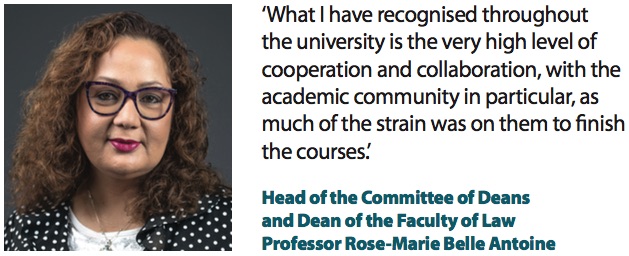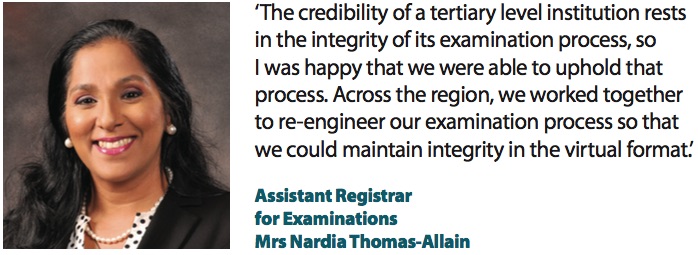
Over the past few months, the education sector has had to make drastic changes to the way it functions. From early March, the Vice Chancellor of The University of the West Indies Professor Sir Hilary Beckles stressed the importance of the internet in adapting to the new normal, saying “We are going to be investing resources in online training, online technology.”
Three months on, the Head of the Committee of Deans (and Dean of the Faculty of Law) at UWI St Augustine Professor Rose-Marie Belle Antoine, reflects on how the crisis has been handled thus far. “From the very beginning, the university was quite proactive,” she says. “A big concern was how to ensure students could complete their courses.”
In the early stages of the process, there was some back and forth over whether the semester should even continue with online classes, as no one at the time knew how long the pandemic and restrictions would last. There were intense discussions at every level on the best way to move forward in the different faculties.
“What I have recognised throughout the university is the very high level of cooperation and collaboration, with the academic community in particular, as much of the strain was on them to finish the courses,” says Prof Antoine.
As staff did their best to transition to the new environment, all of the faculties were able to resume teaching within a week of the official closure of the physical campus facilities. At the core of this was the widespread implementation of online systems unlike ever before. “We had the online systems before, but they were used in a more supplementary way,” the Deans’ Committee Head says.

Although the myElearning platform and other online tools have been within The UWI’s arsenal for many years, the events of the past few months have shed light on how essential access to this technology really is, and how many students who do not have this access are at a disadvantage. As staff and student representatives tried to assess which students were in need, they found that a much larger percentage of the student population had either no computer access or limited internet access than previously thought.
“Internet access can be very uneven, depending on the area someone is living in. This shows a larger problem in education and how we live in Trinidad and Tobago in terms of equity.” - Head of the Committee of Deans and Dean of the Faculty of Law Professor Rose-Marie Belle Antoine
Liaising with organisations willing to donate computers or facilitate internet access helped in resolving this issue. “It is something that we have to think of in the future because our university is committed to increasing access to the under-served, those who are disadvantaged. This computer/internet access is one component,” she adds.

Both Professor Antoine and the Assistant Registrar for Examinations Mrs Nardia Thomas-Allain agree that the most complex aspect of the process has been negotiating an all-new examination process. According to Prof Antoine: “It was a bit of a nightmare, for both students and lecturers”, because of the difficulties in managing the longer exam times to address access issues. But although the undertaking was difficult, Mrs Thomas-Allain feels that “we were able to be agile and to respond in ways that allowed our students to continue to progress academically, both in teaching and in final assessments. We were able to maintain our standard of quality and the integrity of the examination process.”
Although staff were engaged in discussions from a very early stage on what these exams might look like, ultimately the structure was decided by the Board for Undergraduate Studies of The University of the West Indies in the case of undergraduate programmes, and by the Board for Graduate Studies and Research in the case of postgraduate programmes. Students lobbied for longer exam times, and there was a period of rough adjustment as staff and students alike hastened to adapt to the new exam experience.
“There was a high level of stress and mental anxiety on the part of the students and some critical decisions were taken to address these. For example, if anyone fails during this period there will be no penalty towards their GPA,” says Professor Antoine. Mrs Thomas-Allain also stresses that staff made every effort “to be fair, understanding and compassionate to our students.”

For Mrs Thomas-Allain, examinations were an extremely high priority in ensuring that students were able to continue their academic journey. “The credibility of a tertiary level institution rests in the integrity of its examination process, so I was happy that we were able to uphold that process. Across the region, we worked together to re-engineer our examination process so that we could maintain integrity in the virtual format.”
She also expresses her gratitude for the way staff was able to adapt to a crisis, even though there were some challenges faced. Her extended Conduct of Exams Team: Lisa Hernandez, Lynette Dookhran, Prudence Cato, Andre Greaves, Joanna Jeremiah, and Barry Hazel, worked tirelessly to find the best solutions possible in a short period of time. She indicated that it would be remiss of her not to mention Wayne Sarjusingh, who created an unprecedented Campus Final Assessment Timetable in just two weeks.
‘We will tweak our processes moving forward, because now we have a roadmap to guide us through such events, pandemics or any sort of natural or social disaster.’ - Assistant Registrar for Examinations Mrs Nardia Thomas-Allain
While the COVID-19 learning curve has been steep for us all, it has taught some valuable lessons for The UWI moving forward— and any learning institution must be ready to learn.